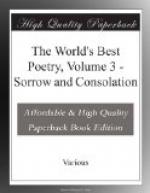PHILIP JAMES BAILEY.
IN MEMORIAM F.A.S.
Yet, O stricken heart, remember, O remember
How of human days he lived the better
part.
April came to bloom and never dim December
Breathed its killing chills upon the head
or heart.
Doomed to know not winter, only spring, a being
Trod the flowery April blithely for a
while,
Took his fill of music, joy of thought and seeing,
Came and stayed and went, nor ever ceased
to smile.
Came and stayed and went, and now when all is finished,
You alone have crossed the melancholy
stream,
Yours the pang, but his, O his, the undiminished
Undecaying gladness, undeparted dream.
All that life contains of torture, toil, and treason,
Shame, dishonor, death, to him were but
a name.
Here, a boy, he dwelt through all the singing season
And ere the day of sorrow departed as
he came.
ROBERT LOUIS STEVENSON.
Davos, 1881.
TEARS.
Thank God, bless God, all ye who suffer not
More grief than ye can weep for. That is well—
That is light grieving! lighter, none befell,
Since Adam forfeited the primal lot.
Tears! what are tears? The babe weeps in its
cot,
The mother singing; at her marriage bell
The bride weeps; and before the oracle
Of high-faned hills, the poet has forgot
Such moisture on his cheeks. Thank God for grace,
Ye who weep only! If, as some have done,
Ye grope tear-blinded in a desert place,
And touch but tombs,—look up! Those
tears will run
Soon in long rivers down the lifted face,
And leave the vision clear for stars and sun.
ELIZABETH BARRETT BROWNING.
RESIGNATION.
There is no flock, however watched and tended,
But one dead lamb is there!
There is no fireside, howsoe’er defended,
But has one vacant chair!
The air is full of farewells to the dying,
And mournings for the dead;
The heart of Rachel, for her children crying,
Will not be comforted!
Let us be patient! These severe afflictions
Not from the ground arise,
But oftentimes celestial benedictions
Assume this dark disguise.
We see but dimly through the mists and vapors;
Amid these earthly damps
What seem to us but sad, funereal tapers
May be heaven’s distant lamps.
There is no death! What seems so is transition:
This life of mortal breath
Is but a suburb of the life elysian,
Whose portal we call Death.
She is not dead,—the child of our affection,—
But gone unto that school
Where she no longer needs our poor protection,
And Christ himself doth rule.
In that great cloister’s stillness and seclusion,
By guardian angels led,
Safe from temptation, safe from sin’s pollution,
She lives whom we call dead.




